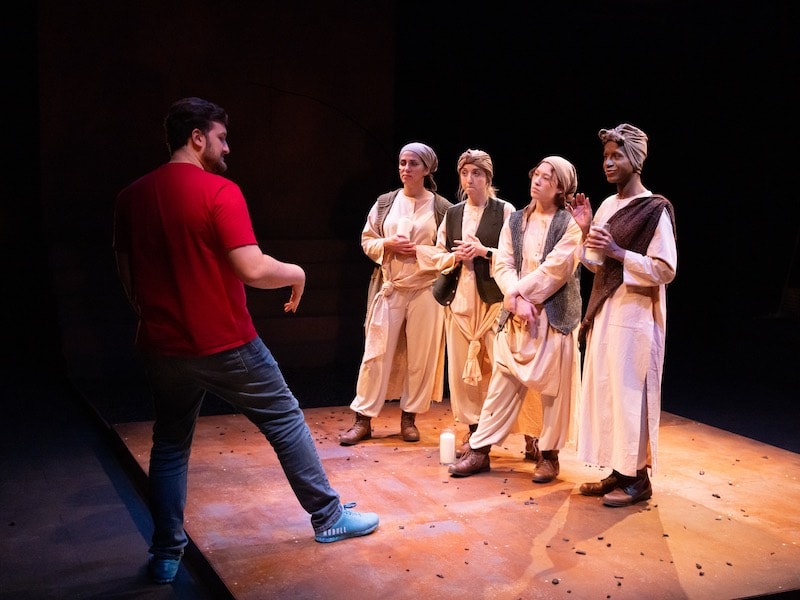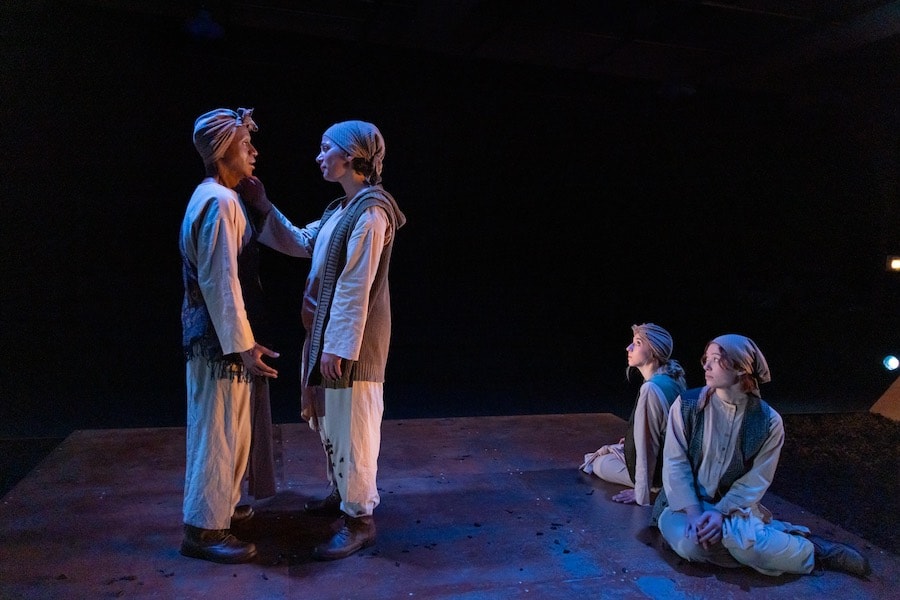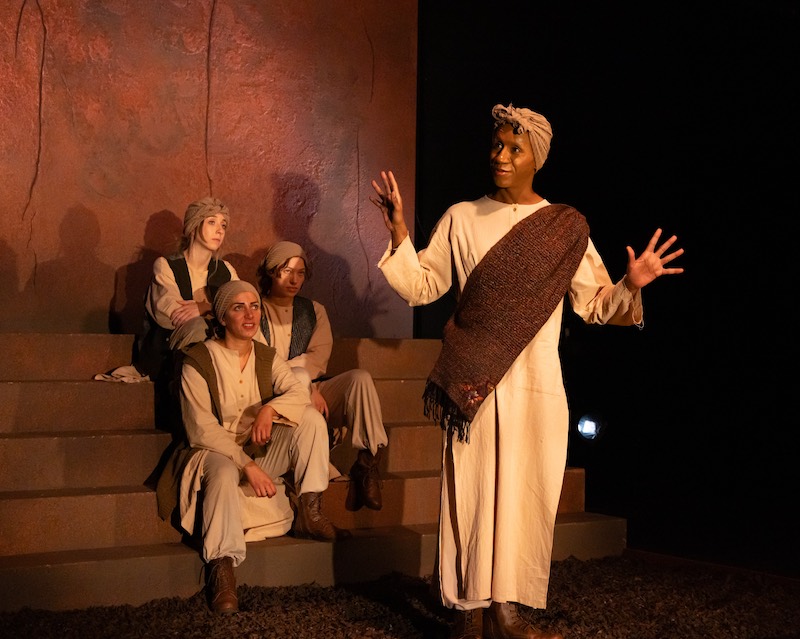Danilo Gambini is the new associate artistic director at Washington, DC’s Studio Theatre and the translator and director of Agreste (Drylands), an acclaimed work by Brazilian playwright Newton Moreno now playing at Spooky Action Theater. A native of Brazil, where he trained and worked in theater and film, Gambini comes to DC by way of New York’s Rattlestick Theater (where he was also associate artistic director) and the Yale School of Drama, where he received an MFA in directing. In addition to directing for Spooky Action and for Studio Theatre, Gambini will be directing a new musical (Thebes) and a new opera (Salt) in the coming months, as well as returning to Yale to direct The Rake’s Progress (at Yale Opera).
I spoke with Gambini about directing and translating Agreste, about the DC theater scene, how theater in Brazil compares with that in the U.S., Gambini’s vision as associate artistic director at Studio, and what it’s like being an immigrant theatermaker in America.

Danilo Gambini in rehearsal with the cast of ‘Agreste (Drylands)’ at Spooky Action Theater: Raghad Almakhlouf, Irene Hamilton, Kate Kenworthy, and Miss Kitty. Photo by Ryan Maxwell Photography.
Deryl: How long have you been in DC, and what’s your impression of the DC theater scene?
Danilo: I moved here six or seven months ago to be the associate artistic director at Studio. I moved here from New York. I was living there for two years, and before that, I was in New Haven for three years going to grad school at the Yale School of Drama. Before that, I was in Brazil. I was living in São Paulo until 2017. I really love DC. That’s the truth of it. I think it’s a very prolific theater community, it’s a very tight-knit theater community. It feels like everyone knows everyone, in a good way, and there’s an ecosystem of theaters here that feels very exciting. There’s so much theater to see and so much different theater to see. I’m in love with both the theater community and the city.
What’s your experience, generally speaking, of how people in New York and New Haven think of the DC theater scene?
In New Haven, the experience was very grad-school–related and very insular. My perception of DC while in New York is that we constantly hear about things going on in theater here. We hear about artists that are from DC or going to DC or working in DC and plays that are coming from DC. It’s a presence. So much so that I was like, OK, I need to go to DC, I need to visit DC. And I did. When my parents were visiting one Thanksgiving, I said, we should go to DC and see some plays, because I keep hearing about it, and I want to get to know the city better.
How old were you when you left Brazil? Did you spend your formative years there?
I’m 37, and when I moved here I was 31. I had my BFA in film and my acting certificate from the conservatory, and I was working professionally as a director for around a decade. So, those were my formative years.

How would you describe — and how do you think about — your new job as associate artistic director at Studio Theatre?
I work on all the shows as a producer. I lead all the community engagement initiatives. I am the local casting director. I also work with the apprenticeship program with the programmatic content.
There have been several associate artistic directors at Studio before you. Does the job stay the same, or is it in some way built around the person in it?
It’s always growing and changing. I arrived in a moment that is, if not post-COVID, at least post-height-of-COVID, so we are in a moment of rebuilding or growing back into ourselves. The responsibilities may be similar, but the job keeps changing with the times. It changes with the configuration of the staff. And of course, it changes with the personality and interests of whoever is occupying this position. There are of course things that I’m more interested in and want to invest more in, which may be different from the people who occupied this position before.
What are some of the things you want to focus on or invest more energy in?
Some things are not so different from what was done before. I want to invest more in EDI [equity, diversity, and inclusion] initiatives, for sure. Since moving to the U.S., I have always been involved in all the meetings and discussions that I can and trying to educate myself about it and be in more sophisticated conversations about it. What are the problems to address, what are the complex, complicated situations to address? Producing is a passion of mine, so I’m looking forward to directing in the theater, which will happen over the next seasons. I think it’s exciting to be sort of a resident artist in the theater because that allows the theater, the institution, to know me for who I am, not for who I represent, to know my artistic strengths as an individual, not just as a representative of something. It feels exciting to really get inside the theater, for people to get to know who I am before I start directing there.

Let’s talk about Agreste (Drylands). Will this be the first play you’ve directed in DC?
Yes. This will be my DC debut.
And it will be a sort of premiere, although you directed the play before, at Yale.
It will be the professional theater premiere of the play. I directed it once at the Yale Cabaret in 2018 or 2019. That was a student production, and it was a different translation. This time around, I wanted to translate it myself.
Have you done other translations of plays?
Yes, from Portuguese to English and from English to Portuguese. I’m working on other projects that might have a future soon being translated from Portuguese to English, so I wanted to start doing it. I wanted to try my hand at it. There’s some interesting flexibility when you’re both the translator and director. There are things that I want to say, and in the rehearsal room, we can question, “Is this saying what it needs to say?” I think translations are sometimes tricky that way — if you translate word for word, it can mean something very different or not what the author wants it to mean. So the act of translation has this aliveness to it.
What is your relationship to playwright Newton Moreno? Is he someone whose work you have followed? And did you bring this work [Agreste] to Spooky Action Theater, or did they reach out to you?
Newton is a big name in Brazil, one of the main playwrights alive right now. I’ve been obsessed with his work since I began working in theater in Brazil. I reached out to him when I was directing Agreste at Yale, and we eventually met when I was back visiting in Brazil. He’s a profoundly talented, creative, and beautiful human being, and we built a professional friendship. When I began to talk with Beth [Elizabeth] Dinkova, the artistic director of Spooky, about possible plays I wanted to direct here at this moment of my career, I said I wanted to do more Greek tragedies because I really love them. [Gambini and Dinkova briefly crossed paths at Yale Drama School.] We were going through some titles that I really like, but there’s been a lot of Greek tragedies around town recently. So I said, “OK, what about this Brazilian tragedy?” And Beth really responded to the script. So I said, “Great. I guess I’m gonna investigate this project again. But this time, I want to do a new translation and translate it myself.”

Why did you choose Agreste as the first play you would direct in DC?
I’ll try to tell you without giving away any spoilers. It’s the kind of theater that excites me in terms of this moment. It has the element of ritual, meaning something real is happening and the performativity gets undressed to focus on who is doing what in the space and telling the story. There is a sacredness to it, a sense of purpose, and something changes. The other thing that really excites me is the attempt to have a political impact — political in the sense of what it means to be me in relationship to others.
Do you mean Danilo Gambini, or any specific individual?
I mean the “I” in relationship to “us.” I’m always excited by plays that attempt to engage politically or in political discourse, to make political change or have political impact. The other thing is entertainment, in terms of the root of the word, which means “to hold in between.” I mean plays that feel like they are holding the audience in between intentions. I’m always trying to find plays to direct that have these aspects, and Agreste does. It’s a very famous Brazilian play, a new classic. It was first staged in 2004, which is when I saw it for the first time. It has had a profound impact in Brazil. It’s a play everyone knows or has heard about or read or produced or worked on.
You grew up in Brazil, trained in the theater there, and worked there. How, broadly speaking, does theater in Brazil differ from theater in the U.S.? Are there important differences or even similarities?
Of course, in Brazil, especially in São Paolo, you can see everything. It’s a very wealthy, theatrical city. But something essentially different in Brazil is that the place we start from is not realism. In America, the starting spot is realism, and from that, you can go anywhere. You can tell from my acting training in Brazil that out of four years in the conservatory, one semester was dedicated to realism. While we investigated realism as deeply as you can in six months, we investigated clowning and improvisation and expressionism and Brecht and devised theater and Theater of the Oppressed the rest of the time — many different languages and forms of expression in storytelling. From my training at Yale, it felt that we started from realism and then went to other places. If anything, this is the biggest difference. We can get to similar endpoints by starting at different places.
You direct in several different genres — straight theater, musical theater, and opera. I believe you’re directing a new musical and an opera in the spring. What are the signal differences in directing in these three forms, and do you have a favorite?
I don’t have a favorite. I love good work. I love good theater and good musicals and good opera. I always try to find a project that touches my heart, where it touches my soul, and I can feel my way in. The intersection of music and theater is my happy place, but that’s not always the case. I can be working on a straight play that has no music and feel profoundly connected and invested and excited about it. There are also TV and film projects that I’m working on and will hopefully be happening in the future. Directing is essentially about bringing the invisible to the visible world, and this you can do in many different ways. There are many kinds of storytelling. But I can’t choose a favorite.
I thought you’d avoid that trap!
Yes! I’m usually working on a number of different projects at the same time, so they don’t feel separate in terms of my daily practice. I’m directing Agreste now and also developing a musical, Thebes, which is not coincidentally an adaptation of many Greek tragedies, and at the same time I’m going to direct an opera at Yale Opera in February.
One of your interests is exploring identity, particularly what it means to be Latino/Latina/Latinx. What does that mean to you, and what do you hope to convey to audiences about these identities?
The honest answer is that I don’t know, and I don’t think I’ll ever know. I think it changes, it has different impacts on me, and it means different things to different people. Iit means that today I live 90 percent of my life in a language that is not my native language. It means that my husband and my family live in another country. It means that I sometimes need to do a deep investigation of “Is it worth it?” Today, it means to me something much closer to the immigrant experience than anything else. In an aesthetic way, it means that I want to reserve to myself the right to tell stories from my visceral impulses, even if I can’t precisely identify if they come from my formative years in Brazil, my theatrical experience in Brazil or here. And not actually separating anything, but respecting who I am fully. It’s not tied entirely to any identity markers that you might think, just more tied to my experience of navigating the world. Operating in a different language, especially, working on a play that I just translated myself, the starkness of language is very present. These are my choice of words, and how much do I want to convey the complexity of ideas in Portuguese in a different language? And also, how much do I understand of the sophistication of English? I wish I had a more straightforward answer, but I don’t. It’s being reminded that, for good or bad, you are “othered.” And sometimes engaging in a very complicated, tender, possibly harmful questioning of whether I’m brought into spaces because of who I am or for what I represent. It’s just like there’s a yearning to be seen and understood for my full self and not just for portions of my identity that might be more or less valuable in certain places.
Tell me about one of your newer projects connected to theater, the Immigrant Theatermakers Advocates. It sounds like what you were just talking about.
When I tell you that I identify with the immigrant experience, it’s because I’m going through my immigration process right now, getting my green card, which will happen soon. Immigrant Theatermakers Advocates came out of Rattlestick Playwrights, which I was part of in New York. A group of us went different ways, but four of us kept in contact. We have all faced institutional xenophobia in unexpected ways, and we have all kept advocating for immigrant rights in whatever place we are. We kept sharing ideas and experiences, and then came the idea that we should organize ourselves in some way and advocate as a group to make it more impactful, and also as a resource for other immigrant artists. If you are yourself an immigrant and as an adult decided to move to the U.S., it comes with a weight, like “You made this decision, so you have to endure it.” There’s a loneliness in this trajectory. We’re trying to bridge that, to make it less lonely for the people who are coming after us, and using whatever positionality we have to advocate against institutional xenophobia or all sorts of xenophobias that we really strongly feel in our bodies. Sometimes, it’s hard to articulate when and where, but as a group we can talk about it and come up with ways to attack it and to dismantle it.
All of you are theatermakers in one form or another?
Yes, the four founding members are Jody Doo [global assistant producer at The Moth], Francisco Mendoza [marketing manager at The Playwrights Realm], Salma Zohdi [literary manager at New York Theatre Workshop], and me. We have an amazing group of immigrant artists working together and a wonderful advisory council that includes Saheem Ali, Sarah Benson, Moisés Kaufman, Olga Levina, Roberta Pereira, and Chay Yew. We just launched this week, and we expect the movement to grow over the next years.

Agreste (Drylands)
By Newton Moreno
Directed and translated by Danilo Gambini
Featuring Raghad Almakhlouf, Irene Hamilton, Kate Kenworthy, and Miss Kitty
About the Play: In the drylands of northeast Brazil, a kingdom of sand and thirst, Maria and Etevaldo fall in love across a fence. After living together as husband and wife for 22 years, the sanctity of their union gets invaded by the gossip and gibes of a conservative community. Four storytellers breathe life into this tale of love and loss, desire and death, ignorance and illumination. Based on real events, Newton Moreno’s stunning narrative shows that love can bloom even in the harshest climate.
Running Time: Approximately 75 minutes, no intermission.
Agreste (Drylands) plays to November 19, 2023 (Thursday, Friday, Saturday at 7:30 p.m. and Sunday at 3 p.m. and 7 p.m.) presented by Spooky Action Theater performing at The Universalist National Memorial Church, 1810 16th St NW, Washington, DC. Tickets (general admission, $37.50; students with valid ID, $20; seniors 65 and over, $35.50) are available online.
COVID Safety: Masks are optional except for mask-required performances on November 5 at 3 p.m. and November 11 at 7:30 p.m
SEE ALSO: Spooky Action to stage U.S. premiere of play by Brazilian Newton Moreno (news story, October 1, 2023)





What on earth does “It has the element of ritual, meaning something real is happening and the performativity gets undressed to focus on who is doing what in the space and telling the story.” even mean?? I hope the show is less pretentious than its director.